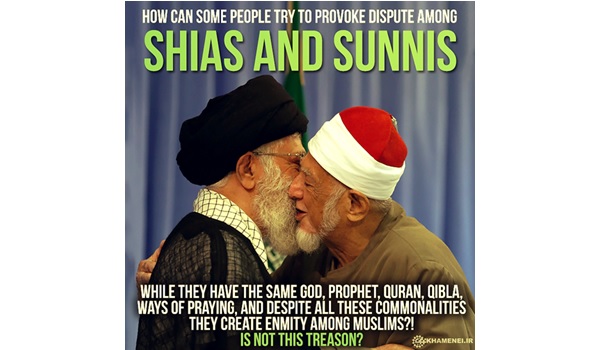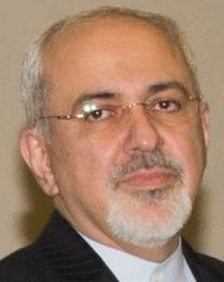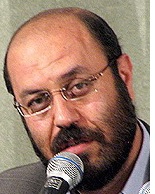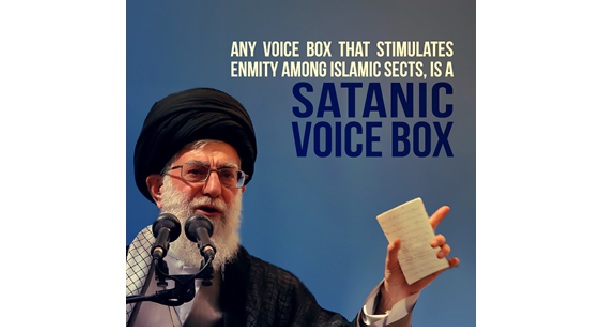Iran’s top religious and political leaders are alarmed by growing Sunni-Shiite tension in the Middle East. Tehran is especially worried about the influx of Sunni militants into Syria, al Qaeda’s resurgence in Iraq, and Sunni-Shiite clashes in Lebanon. Sectarian violence is “the most serious security threat not only to the region but to the world at large,” Foreign Minister Mohammad Javad Zarif warned in a November 2013 BBC interview. And in October 2013, President Hassan Rouhani called for Muslim unity and regional cooperation to prevent bloodshed.

Other Iranian leaders are blaming
the intra-Muslim fighting on the West, Israel and the Sunni Gulf states. Western intelligence services are fomenting “bloody sectarian, ethnic and national conflicts” in Syria and elsewhere with “the help of [Arab] petrodollars,” Supreme Leader Ayatollah Ali Khamenei
charged in April 2013. Saudi Arabia is “fulfilling Zionists’ orders for fomenting sectarian war in the Muslim world,”
claimed Reza Mohseni Sani, a member of parliament’s National Security and Foreign Policy Commission.
The Shiite theocracy has a strategic interest in preventing further Sunni-Shiite violence. Iran is the biggest Shiite country in the world. Some 89 percent of its 79 million people are Shiites. But
overall, they are a minority in the Middle East. Outside of Iran, Shiites make up only 11 to 14 percent of the region’s Muslim population, according to the Pew Research Center. Bahrain and Iraq are the only other Arab countries with majority-Shiite populations, while Yemen is
estimated to be 35 percent Shiite. The following is a rundown of remarks by top Iranian leaders on sectarianism.
Supreme Leader Ayatollah Ali Khamenei
“One of the great plights in the world of Islam today is the plight imposed intentionally and wickedly by the#arrogant powers to inflame discords among the Islamic nation and religious sects.
“The arrogant and #imperialist system is highly experienced at sowing religious discords…
“Confrontation of religious sects will not be limited to #Shia and #Sunni conflicts…”
Nov. 11, 2013 in a meeting with Hajj (pilgrimage to Mecca) officials
“Any statements and actions that set fire between Muslims or insulting sanctities of any Muslim sects is a service to the camp of disbelievers and haram.”
Oct. 14, 2013 at a ceremony marking the beginning of the Hajj

“It is necessary that both Sunnis and Shiites understand, as well as everyone in Iran and the Muslim world, that the disagreement between Shiites and Sunnis is one of the tools and equipment of the enemy [used] against the Muslim community.”
Aug. 21, 2013 Facebook posting with a quote from Aug. 8, 2006
President Hassan Rouhani
The following
tweet refers to President Rouhani’s call with Qatari Emir Sheikh Tamim bin Hamad al Thani.
“We should fight terrorism in unity. This terrorist attack [on the Iran-Iraq gas pipeline] revealed that terrorists targeted material and spiritual interests of different religions and ethnicities.”
Dec. 15, 2013 in a phone call with Iraqi Prime Minister Nouri al Maliki
Foreign Minister Mohammad Javad Zarif

“I think we need to come to understand that a sectarian divide in the Islamic world is a threat to all of us.”
“Some people have fanned the animosity for short-sighted political interests.”
“This business of fear-mongering has been a prevalent business… Nobody should try to fan the flames of sectarian violence. We should reign it in, bring it to a close, try to avoid a conflict that would be detrimental to everybody's security.”
“I think all of us... regardless of our differences on Syria, we need to work together on the sectarian issue.”
Nov. 10, 2013 in an interview with the BBC
“Iran believes that what is happening in Syria can have a huge impact on the future of our region and the future beyond the region. Because we believe that if the sectarian divide that some people are trying to fan in Syria becomes a major issue it will not recognize any boundaries. It will go beyond the boundaries of Syria. It will go beyond the boundaries of this region. You will find implications of this on the streets of Europe and America.”
Dec. 7, 2013 in an interview with TIME magazine
Defense Minister Brig. Gen. Hossein Dehqan

The “inhuman and dangerous phenomenon of takfiri terrorism” and extremism is spreading “from Syria to Iraq.”
Chairman of Parliament's National Security and Foreign Policy Committee Alaeddin Boroujerdi
“The terrorist groups including al Qaeda and the al Nusra Front in Syria are serving the interests and policies of the United States and Britain through the brutal killing of this country’s [Syria] Muslim people.”
Oct. 29, 2013 in a meeting with a member of Somalia’s parliament
Member of Parliament Ali Motahari
“Western countries are after dispersion in the Islamic World and on account of such fact, Muslim scholars, both Shiites and Sunnis, should stand against such danger hand in hand. The takfiri movements are the brain child of Wahhabi credos, traced back to many years ago, which of its nature, reject other Islamic sects and denominations and do not even recognize the four main Islamic Schools of Sunni denominations.”
“Intimidated by Muslim nations’ power, Western countries seek disunity in the Islamic world. And the more dispersion pervades Islamic countries, the more benefit they [Western countries] will reap.”
Grand Ayatollah Nouri Hamedani
“Our message to Sunni community is that we should not let the enemy to take advantage of our divide. We need to unify against the common enemy.”
Dec. 28, 2013 in a meeting with members of Hezbollah, Lebanese Shiite militia and political party
Member of Parliament's National Security and Foreign Policy Committee Mohammad Reza Mohseni Sani
“Saudi Arabia is the U.S. and the Zionist regime’s agent in the region… Fulfilling Zionists' orders for fomenting sectarian war in the Muslim world is Saudi Arabia’s mission.”
Tehran's Interim Friday Prayer Leader Ayatollah Seyed Ahmad Khatami
“Prominent Sunni clerics, who are highly disappointed with the conduct of the murderer takfiris [Muslims who declare other Muslims unbelievers] are advised to join Shiite clerics in announcing that those criminals’ deeds are totally unrelated to Islam. The Shiite and Sunni clerics will save Islam’s prestige if they do so.”
Parliament's National Security and Foreign Policy Committee Spokesperson Hossein Naqavi Hosseini
“The petrodollars of some regional governments are in the pockets of takfiri terrorists, Salafis and extremist groups… Saudi Arabia’s support of takfiris in Syria, terrorist activities in Iraq and Lebanon, Pakistan, Russia and even some European countries such as Serbia and Bosnia shows that a great threat [is jeopardizing] the region’s security.
“Many al Qaeda-linked terrorist groups are being supported by the Saudi Arabian government, and what [Saudi Intelligence Chief] Bandar bin Sultan looks for in Saudi Arabia is worrying for the entire region, and the international community must deal with such moves.”
Grand Ayatollah Mohammad Ali Taskhiri
“The Iranian nation during history has played an important role in supporting Sunni Muslims to the point that imams of Sunni denomination and even the authors of Sunni reference books were all from Iran… Both Shiite and Sunni [sects] are necessary for a perfect understanding of Islam.
“The crimes committed against the Iraqi nation by terrorists and takfiri groups are a tragedy…The disagreement between different Islamic denominations in Iraq is probably a result of the high rate of violence in the country.”
Brig. Gen. Mohammad Reza Naqdi
“The Zionists are trying to stage a sectarian war among Muslims with the help and the support of the United States and Britain in a bid to delay their destruction.”
Photo credits: Khamenei.ir via Facebook, Mohammad Javad Zarif via US State Department, Hossein Dehqan via Ministry of Defense
 Other Iranian leaders are blaming the intra-Muslim fighting on the West, Israel and the Sunni Gulf states. Western intelligence services are fomenting “bloody sectarian, ethnic and national conflicts” in Syria and elsewhere with “the help of [Arab] petrodollars,” Supreme Leader Ayatollah Ali Khamenei charged in April 2013. Saudi Arabia is “fulfilling Zionists’ orders for fomenting sectarian war in the Muslim world,” claimed Reza Mohseni Sani, a member of parliament’s National Security and Foreign Policy Commission.
Other Iranian leaders are blaming the intra-Muslim fighting on the West, Israel and the Sunni Gulf states. Western intelligence services are fomenting “bloody sectarian, ethnic and national conflicts” in Syria and elsewhere with “the help of [Arab] petrodollars,” Supreme Leader Ayatollah Ali Khamenei charged in April 2013. Saudi Arabia is “fulfilling Zionists’ orders for fomenting sectarian war in the Muslim world,” claimed Reza Mohseni Sani, a member of parliament’s National Security and Foreign Policy Commission. 
 “It is necessary that both Sunnis and Shiites understand, as well as everyone in Iran and the Muslim world, that the disagreement between Shiites and Sunnis is one of the tools and equipment of the enemy [used] against the Muslim community.”
“It is necessary that both Sunnis and Shiites understand, as well as everyone in Iran and the Muslim world, that the disagreement between Shiites and Sunnis is one of the tools and equipment of the enemy [used] against the Muslim community.” “I think we need to come to understand that a sectarian divide in the Islamic world is a threat to all of us.”
“I think we need to come to understand that a sectarian divide in the Islamic world is a threat to all of us.” The “inhuman and dangerous phenomenon of takfiri terrorism” and extremism is spreading “from Syria to Iraq.”
The “inhuman and dangerous phenomenon of takfiri terrorism” and extremism is spreading “from Syria to Iraq.”